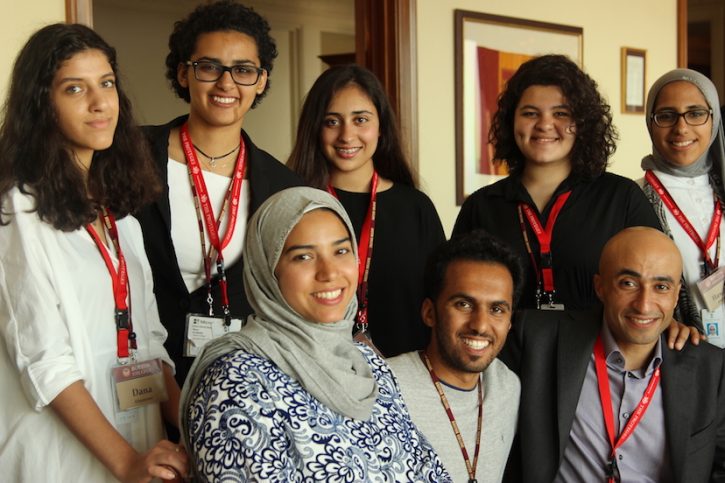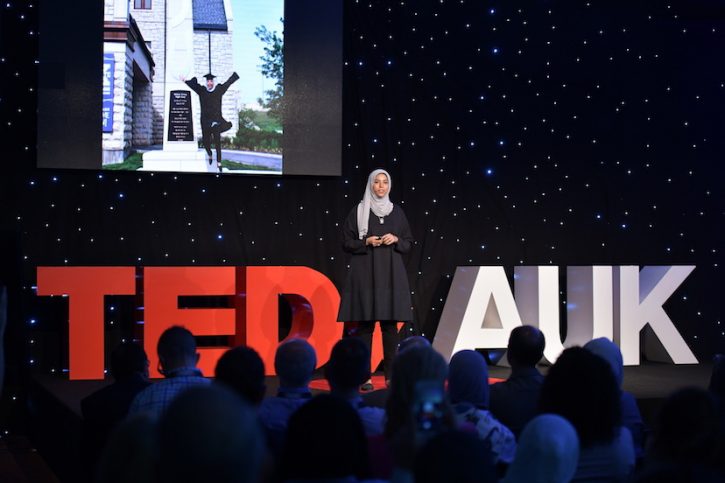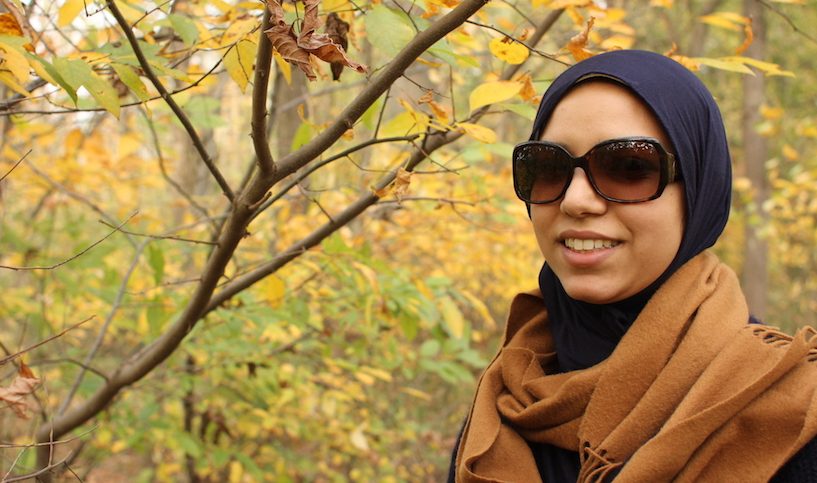Up until a few years ago, a career in psychotherapy in Kuwait was severely discouraged. Very little was known and rarely spoken about mental health and disorders, while the whole subject was largely taboo. It is still a work-in- progress, but thanks to youngsters like Fatmah Al Qadfan, who have dared to break free from convention, promising changes are taking place. AUK alumna, Fatmah has become the first and only registered drama therapist not only in Kuwait but also the GCC, bringing a popular form of creative expression and healing to the region.
This interview has been in the making for over a year. I first met Fatmah in 2016, when she had just returned to Kuwait, after completing her internship and looking for a job. We met again earlier this year, and the soft spoken, empathetic, and amazingly calm Fatmah, patiently described the nuances of her chosen profession, of which I admittedly knew nothing.
Right from the beginning it was abundantly clear that Fatmah is passionate about her work. Her eyes sparkled when she spoke about what she does–which is so vast, it was hard to sum up in this article.
So, what is drama therapy? The North America Drama Therapy Association (NADTA), the governing body which establishes guidelines for Registered Drama Therapist (RDT) credential and accreditation for MA level programs and sets guidelines in the USA and Canada, cites ‘the foundation of drama therapy lies in drama, theater, psychology, psychotherapy, anthropology, play and interactive and creative processes’.
Fatmah describes it as ‘a marriage of psychology and theatre’. “As opposed to psychotherapy, wherein a patient is usually seated and talks about their problem, drama therapy involves movements, playing games, drawing, sculpting or a combination of all as means of expressing inner turmoil,” she explained.
Owing to the absence of a licensing board in Kuwait (a subject that needs to be addressed), Fatmah is presently a registered therapist with the North America Drama Therapy Association (NADTA). Although she studied Anthropology at AUK as an undergrad, it isn’t surprising that she ended up in the field of psychotherapy.
As a child, Fatmah was in love with the theatre and claims ‘she was happiest when in one’. “In school, I started taking drama classes,” Fatmah reminisces, but soon discovered that she was stage shy. Undeterred, she moved onto lighting design before transitioning into directing, unaware at the time that all of it was subtly nudging her towards her future calling. While at AUK, she studied anthropology during the day, and at night directed plays.

After completing her undergrad studies, Fatmah admits doing ‘some responsible jobs like an adult’, flashing me her lovely smile. But her heart was always in theatre, and so she decided to pursue her masters in drama therapy.
Fortunately, Fatmah had distanced herself from the idea that she had to study ‘what is in demand’ or what Kuwait needed. She reveals, “I got a full scholarship from Kansas State University and for the next three years, I studied, interned, had a job on campus, and directed plays. If you believe in something, you’ll make it work anywhere.”
It’s strange how life has a way of working out itself. It was by chance that Fatmah happened to watch a documentary, 12 Angry Lebanese, written and directed by Zeina Daccache, a Lebanese drama therapist. For the first time, the award-winning documentary made Fatmah realize that she may have found her calling. “It was drama therapy in prison, and it struck me as the profession I was meant to do, but never knew it,” Fatmah says, while admitting how, until then, she had no clue what drama therapy was, but ‘connected’ with it instantaneously.
As I write this interview, I realize that today the young woman is neither shy nor uncertain. She later invited me to observe one of her group-workshops with The Proteges, enabling me to witness drama therapy—and her—in action. Seated in a circle, bonfire-style, Fatmah held her audience captivated with her composed voice, and calculated direction. No two sessions or workshops are the same; and each varied and designed to address the specific needs of the client. “Sometimes, I follow a plan; sometimes, I have to improvise to ensure my clients remain engaged,” she explains.

“People are good at avoiding words to express, or even if we do, we filter them, which doesn’t always address the problem with clarity,” she answers in response to my question on how it was different from general therapy. She further elaborates on the technique, “Through creative means—arts, drama, music, role play—people surprisingly express more honestly how they feel or see things. So, it’s a much more powerful way to deal with issues, than if I ask them to simply talk about it.”
Drama therapy has proven effective in the treatment of autism, eating disorders, and a wide spectrum of developmental disorders in children, adolescents as well as adults. Fatmah is confident that drama therapy will do particularly well in Kuwait, adding: “We [Arab people] like expressing, we are an expressive society.” Drama therapy can also benefit corporations that want to address underlying stress, and boost productivity.
She points out the importance of play in our lives even as we grow older: “We learn through play, just like teaching a child, but at some point, we think we are too old to play games as adults.” In her opinion, the best way to heal or move forward in life is by playing games! Now, who wouldn’t love to do that, right?
Naturally, like most challenging professions, hers can be emotionally draining, too. Fatmah ensures us that she takes care of herself by acknowledging that ‘she can’t help everyone… and taking on only as much as she can handle’. Travelling effectively de-stresses her. And if it includes a body of water, you have a healing elixir. “Water sooths me,” laughs Fatmah, “Being by the ocean or even taking a shower rejuvenates me completely.”
Although many aspects of her field interest her, Fatmah is keen on working with people suffering from complex trauma. Unlike PTSD, which usually is the outcome of a traumatic incident or experience, complex trauma traces back to adverse childhood experiences—a result of neglect, family violence or abuse.
In her spare time, Fatmah volunteers with the Proteges, conducting workshops on communication and personal development skills, and travels to both relax and expand her education. She has volunteered internationally as well as locally at Bayt Abdullah, Friends Who Care and worked with Nuqat.
As we wrapped up our interview, I asked her why she came back, when she loved working in the USA, to which she replied, “A big part of me wanted to bring the profession to Kuwait. I want to see more drama therapists here, at home.”
Fatmah Al Qadfan is a therapist with FSHN and can be reached for consultation via their website: www.fsrikuwait.org. For more information, visit dramatherapykuwait.com. Images courtesy of Fatmah Al Qadfan. Details about Fatmah’s upcoming event are in the link below.










